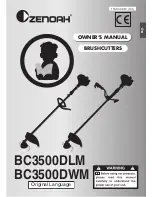
GB-15
BC3500DLM / BC3500DWM
G
B
8. Operation
3. How you can maintain the best control:
a. Keep a good, firm grip on the unit with both hands.
A firm grip can help neutralize bounce. Keep your
right and left hands completely around the respec-
tive handles.
b. Keep both feet spread apart in a comfortable
stance and yet braced for the possibility that the
unit could bounce. Do not overreach. Keep firm
footing and balance.
MAINTENANCE
BLADE
• Check the blade and the fasteners for looseness,
cracking, or bending.
• Check the cutting edges and reform with a flat file.
Point:
Saw blade
8-teeth blade
4-teeth blade
R1 ~ 1.5 mm
R .04 in
1.9 ~ 2.2 mm
.08 in
R2 ~ 3 mm
R .09 in
R3 ~ 4 mm
R .13 in
1 ~ 2 mm
.01 in
R2 ~ 3 mm
R .09 in
R4 ~ 5 mm
R .18 in
3 ~ 4 mm
R .13 in
1. Keep the end corner sharp.
2. Round the root of the edge, using a round file.
3. Do not use water when using a grinder.
IMPORTANT
• It is recommended that filing should be done by pro-
fessionals.
• Especially regarding filing the saw blade, leave it to
the professionals.
TRANSPORTING THE UNIT
• When you finish cutting in one location and wish to
continue work in another spot, turn off the engine, lift
up the unit and carry it, paying attention to the
blade.
• Never forget to place the protective cover over the
blades.
• When transporting the unit over long distances,
detach the blade and fasten the unit by ropes.
By using the harness, hang the unit on your right side.
Adjust the harness length so that the cutting head may
become parallel to the ground.
WARNING
Make sure to use harness and cutting attachment
guard. If not, it is vary dangerous when you slip or
lose your balance.
WARNING
CONTROLLING BLADE THRUST
Blade thrust can cause serious personal injury.
Carefully study this section. It is important that you
understand what causes blade thrust, how you can
reduce the chance of blade thrust and how you can
remain in control of the unit if blade thrust does
occur.
1. What causes blade thrust:
• Blade thrust can occur when the moving blade
contacts an object that it cannot cut. This contact
causes the blade to stop for an instant and then
suddenly move or “bounce” away from the object
that was hit. The operator can lose control of the
unit and the blade can cause serious personal
injury to the operator or any person nearby if the
blade contacts any part of the body.
2. How you can reduce the chance of blade thrust:
a. Recognize that blade thrust can happen. By un-
derstanding and knowing about bounce, you can
help eliminate the element of surprise.
b. Cut fibrous weeds and grass only. Do not let the
blade contact materials it cannot cut such as hard,
woody vines and bushes or rocks, fences, metal,
etc.
c. Be extra prepared for bounce if you must cut
where you cannot see the blade making contact
such as in areas of dense growth.
d. Keep the blade sharp. A dull blade increases the
chance of bounce.
e. Avoid feeding the blade too rapidly. The blade
can bounce away from material being cut if the
blade is fed faster than its cutting capability.
f. Cut only from your right to your left.
g. Keep your path of advance clear of material that
has been cut and other debris.


















